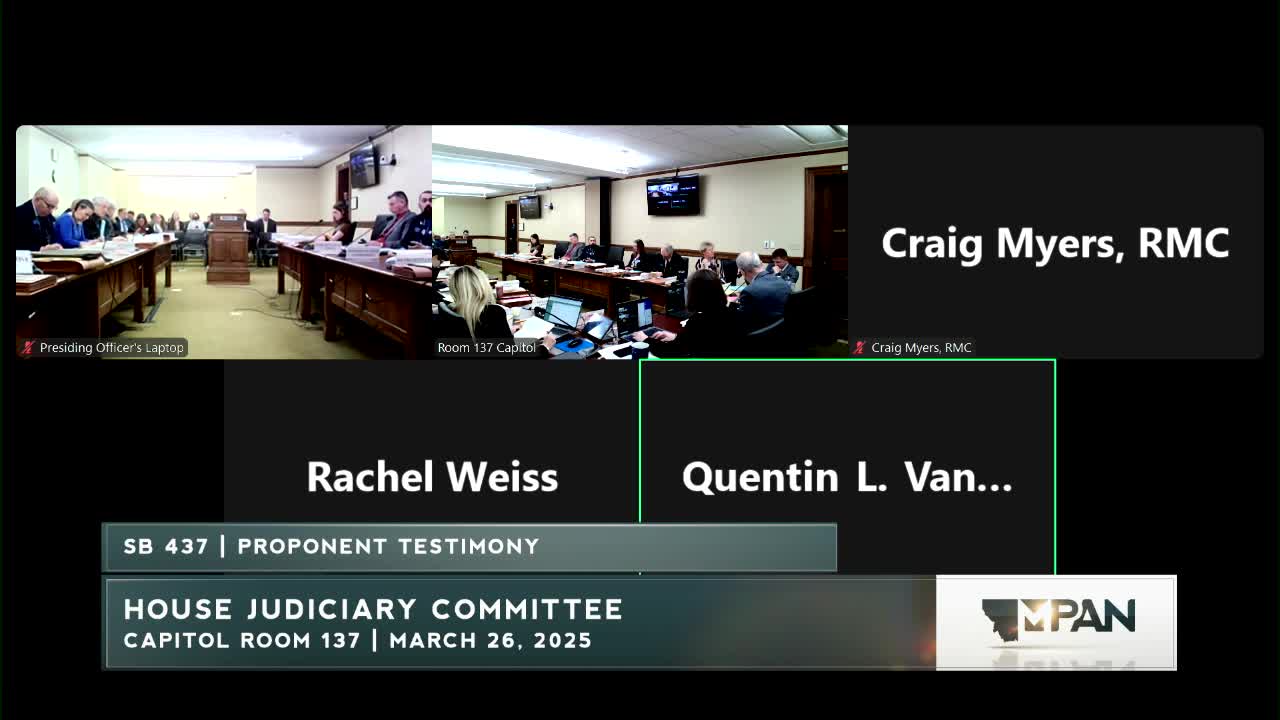Doctor Clacken critiques John Money's controversial gender identity experiments at Johns Hopkins
March 26, 2025 | 2025 Legislature MT, Montana
This article was created by AI summarizing key points discussed. AI makes mistakes, so for full details and context, please refer to the video of the full meeting. Please report any errors so we can fix them. Report an error »

In a recent meeting of the Montana House Judiciary Committee, a heated discussion unfolded around the complexities of gender identity and medical ethics, particularly focusing on the controversial practices of Dr. John Money, a figure known for his work in gender identity during the late 20th century.
The meeting began with a medical professional, Mr. Van Meter, who briefly addressed the committee before needing to leave for another appointment. He emphasized the importance of understanding biological differences in treatment, noting that the physiological responses to hormones vary significantly between males and females. This foundational knowledge is crucial for medical practitioners when addressing patient care.
As the conversation progressed, Representative Clacken raised questions about Dr. Money's legacy, prompting Van Meter to recount his experiences as a student under Money at Johns Hopkins. He described Money as a complex figure whose experiments, conducted without informed consent, led to disastrous outcomes, including the deaths of two patients. Van Meter criticized Money's ethical standards, suggesting that his agenda undermined family structures and contributed to harmful practices in gender transition.
The discussion took a more intense turn when committee members debated the implications of Money's work. Van Meter revealed that none of the adult patients treated under Money's guidance showed improvement in mental health, leading to the eventual closure of his program by the department chair at Johns Hopkins. This revelation sparked objections from other committee members, who sought to defend the integrity of the medical profession against what they perceived as an unfair characterization of Money's contributions.
As the meeting concluded, the tension surrounding the topic of gender identity and medical ethics remained palpable. The implications of these discussions extend beyond the confines of the committee room, touching on broader societal debates about gender, identity, and the responsibilities of medical professionals. The committee's exploration of these issues reflects a growing need for clarity and ethical standards in the evolving landscape of gender-related healthcare.
The meeting began with a medical professional, Mr. Van Meter, who briefly addressed the committee before needing to leave for another appointment. He emphasized the importance of understanding biological differences in treatment, noting that the physiological responses to hormones vary significantly between males and females. This foundational knowledge is crucial for medical practitioners when addressing patient care.
As the conversation progressed, Representative Clacken raised questions about Dr. Money's legacy, prompting Van Meter to recount his experiences as a student under Money at Johns Hopkins. He described Money as a complex figure whose experiments, conducted without informed consent, led to disastrous outcomes, including the deaths of two patients. Van Meter criticized Money's ethical standards, suggesting that his agenda undermined family structures and contributed to harmful practices in gender transition.
The discussion took a more intense turn when committee members debated the implications of Money's work. Van Meter revealed that none of the adult patients treated under Money's guidance showed improvement in mental health, leading to the eventual closure of his program by the department chair at Johns Hopkins. This revelation sparked objections from other committee members, who sought to defend the integrity of the medical profession against what they perceived as an unfair characterization of Money's contributions.
As the meeting concluded, the tension surrounding the topic of gender identity and medical ethics remained palpable. The implications of these discussions extend beyond the confines of the committee room, touching on broader societal debates about gender, identity, and the responsibilities of medical professionals. The committee's exploration of these issues reflects a growing need for clarity and ethical standards in the evolving landscape of gender-related healthcare.
View full meeting
This article is based on a recent meeting—watch the full video and explore the complete transcript for deeper insights into the discussion.
View full meeting
